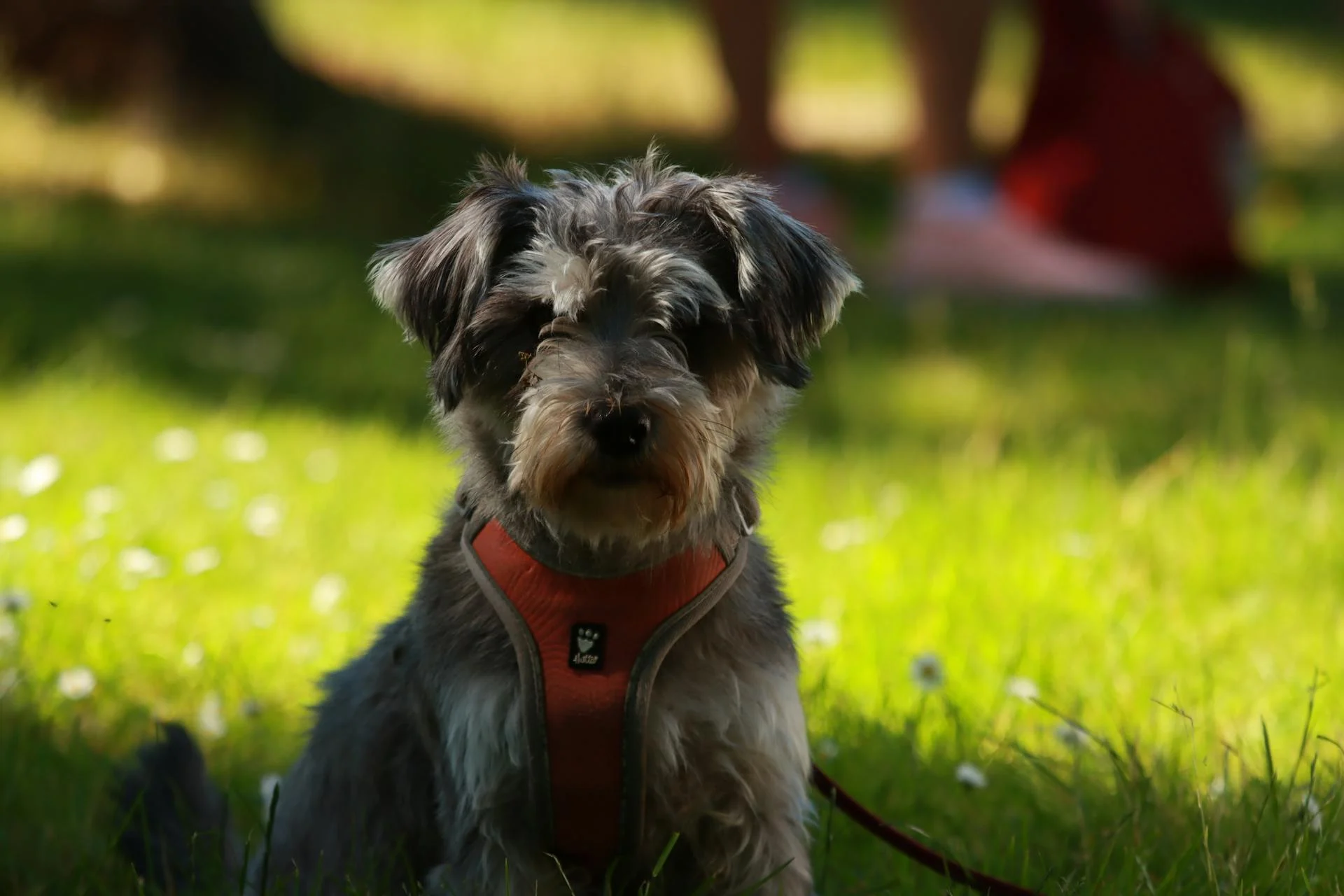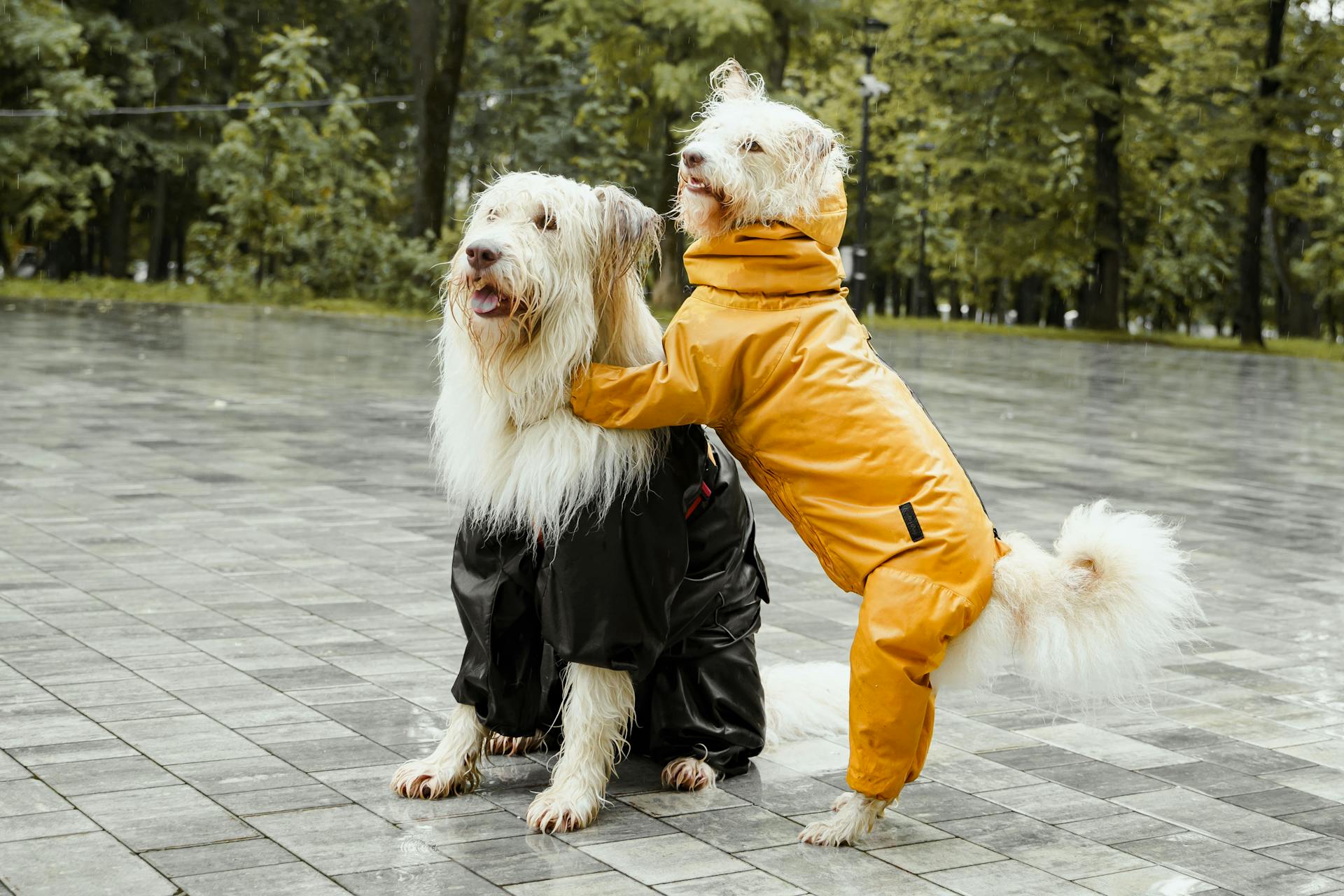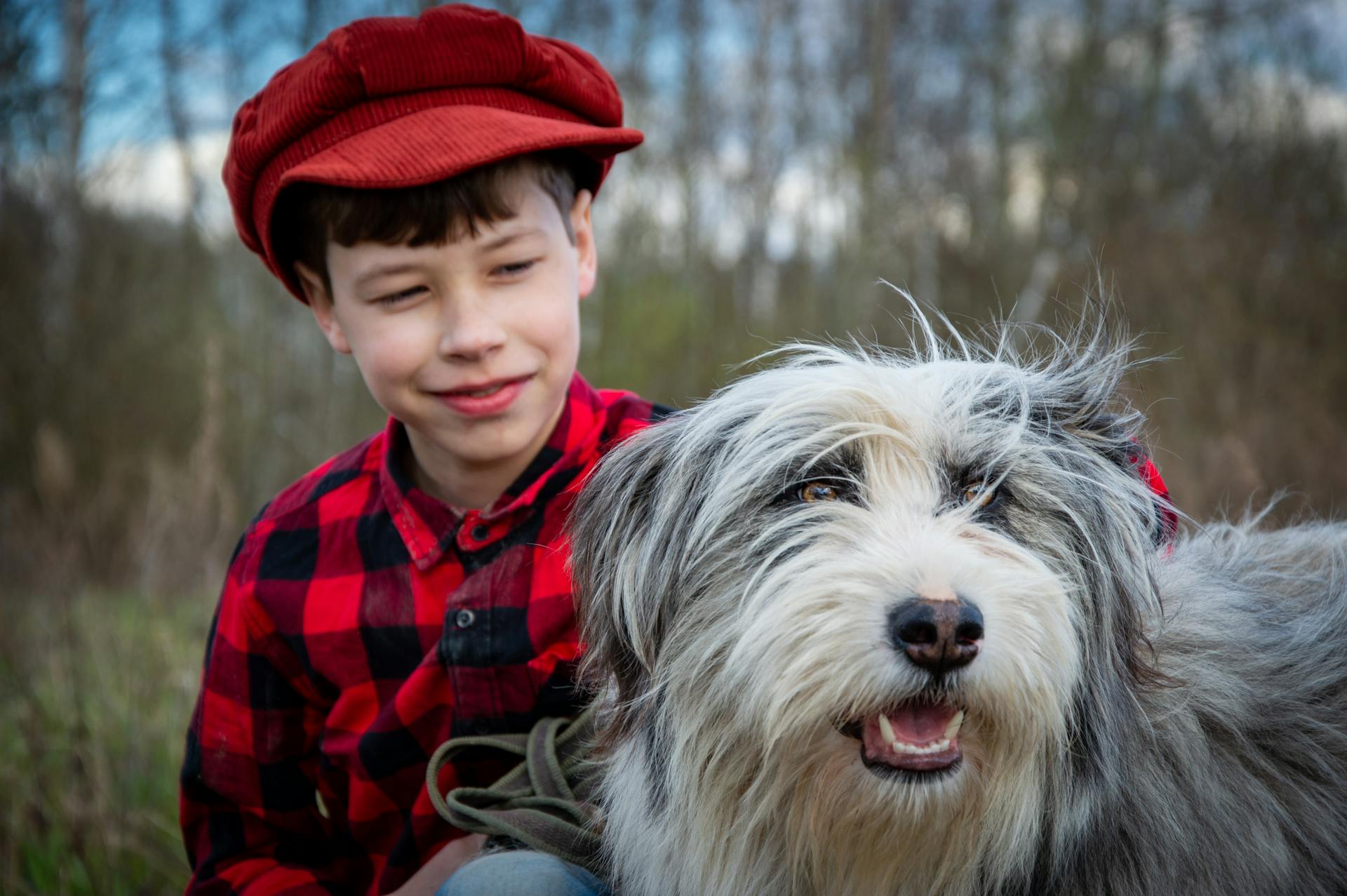
The Bearded Collie is a medium-sized dog breed that originated in Scotland in the 16th century. They were bred to herd sheep and other livestock, and their distinctive beards and mustaches are a result of this heritage.
Bearded Collies are highly intelligent dogs that thrive on mental and physical stimulation. They require regular exercise and training to prevent boredom and destructive behavior.
Their thick, medium-length coat requires regular grooming to prevent matting and tangling. A weekly brushing session can help keep their coat in good condition.
Bearded Collies are generally healthy dogs, but they can be prone to certain health issues such as hip dysplasia and eye problems. Regular veterinary check-ups can help identify these issues early on.
Quick Facts
The Bearded Collie is a fantastic breed, and here are some quick facts to get you started:
Origin: Scotland, where this herding breed originated.
These dogs are medium-sized, with a weight range of 45 to 55 pounds and a height of 20 to 22 inches.
Bearded Collies have a long, shaggy coat in a variety of colors, which requires regular grooming to prevent matting.
Their temperament is intelligent, playful, and affectionate, making them a great companion for active families.
Bearded Collies are easy to train, thanks to their high intelligence and willingness to please.
Here's a breakdown of the breed's key characteristics:
Bearded Collies are generally healthy, but like many breeds, they can be prone to certain genetic conditions like hip dysplasia and progressive retinal atrophy.
Trainability and Behavior
Bearded Collies are intelligent, quick learners, and independent, making them a fun and effective breed to train.
They thrive on consistency, patience, and reinforcement, and their eagerness to please their owners makes them a joy to train. Consistency is key, as they can get bored with tasks if they're not kept interesting.
Early socialization is crucial for Bearded Collies, and exposing them to different people, pets, and environments from a young age helps them become well-adjusted adults. This can be as simple as strolling through parks or visiting friends' homes.
A unique perspective: How to Train a German Shorthaired Pointer to Hunt
Bearded Collies require regular exercise for physical and mental health, including fetching games, agility training, and long walks or hikes, to burn off their energy. This helps keep them happy and healthy.
Bearded Collies can be rewarding to train due to their intelligence and athleticism, making them successful in agility and obedience sports. However, they may become stubborn or vocal if they're not properly trained and mentally stimulated throughout the day.
They're intelligent dogs that need lots of mental stimulation to stay happy, and this can be achieved with interactive toys and training from an early age. If they don't get enough exercise or attention, they can get extremely vocal and commence nuisance barking.
Bearded Collies are generally fairly tolerant and good with children, as long as the children know how to properly interact with their dog. They're especially well-suited for active families with children that play often with the dog.
Bearded Collies are a working breed, and they'll enjoy helping out around the home and being given tasks to complete. They're eager to please their owners and love to learn new things.
However, they may become bored with the same routines each day and stubborn or vocal in response, so it's essential to keep things fluid and change training techniques or lessons often. This will help keep them engaged and prevent bad habits from forming.
You might enjoy: Shiba Inu Stubborn
Exercise and Health
Bearded Collies are generally healthy dogs, with a lifespan of around 12 to 14 years. They can be prone to certain health issues, including hip dysplasia, thyroid problems, and collie eye anomaly.
Regular check-ups with a reputable vet can help detect and manage these issues early. This is especially important for Bearded Collies, as they can develop these problems due to their genetics.
To keep your Bearded Collie happy and healthy, they need plenty of exercise. Daily walks, games of fetch, or even participating in dog sports like agility or barn hunt can help burn off their energy and prevent boredom-related behaviors.
A healthy teen and adult Bearded Collie should get at least 1 hour of exercise each day in the form of brisk walks or similar activities. This can include jogging, hiking, or running next to a bike, along with other physical engagements like playing fetch or interacting with puzzle toys at home.
Historically a working and herding breed, Bearded Collies are very energetic and need lots of time spent playing outdoors. They thrive when able to work alongside their owners, so be prepared to give your dog lots of outdoor playtime and long walks each day.
A fresh viewpoint: Do Border Collies Need to Be Groomed
Exercise Needs
Exercise needs are a top priority for Bearded Collies, and they require daily physical activity to stay happy and healthy. A minimum of 1 hour of exercise per day is recommended for teen and adult Bearded Collies, which can include brisk walks, jogging, hiking, playing fetch, and interacting with puzzle toys at home.
Bearded Collies are extremely energetic and lively, making them perfect for active households and families. They need lots of time spent playing outdoors, and they thrive when able to work alongside their owners.
To ensure your Bearded Collie gets enough exercise, you'll need to give them lots of outdoor playtime, take them for several long walks each day, and ensure they can run freely around a dog park or other open area often. This will help them meet their physical and socialization needs.
A Bearded Collie's exercise needs vary depending on their age. Puppies and seniors don't need as much exercise as teens and adults do, but it's still essential to provide them with regular physical activity to maintain their health and well-being.
Here are some exercise ideas for your Bearded Collie:
- Brisk walks
- Jogging
- Hiking
- Playing fetch
- Interacting with puzzle toys at home
- Participating in dog sports like agility or barn hunt
Remember, Bearded Collies love to dig, so make sure to provide them with plenty of opportunities for exercise and mental stimulation to prevent boredom-related behaviors.
Do Dogs Shed?
Some breeds, like the Bearded Collie, are average shedders, requiring regular brushings and baths to contain the amount of fur they shed around the home.
Bearded Collies, despite their long coats, are not heavy shedders. Regular grooming can help keep their shedding under control.
Dogs shed to some degree, but the amount can vary depending on the breed and individual dog.
Grooming and Care
Bearded Collies require regular grooming to prevent mats and tangles in their shaggy coats. Brushing them a few times a week is essential to remove loose hair and maintain their coat's health.
Daily brushing is a must to get rid of debris and keep tangles in check. It's best to do this outside so loose hair doesn't end up floating around your house.
Bathing is not usually necessary unless mud or exposure to toxins is involved, then just be sure to use a dog-safe shampoo. Regular nail trimming should be done with a grinder to minimize the risk of cutting the nails too short.
A Bearded Collie's coat needs to be brushed a few times a week to prevent tangles and mats. This is a great way to bond with your pet and keep their fur looking shiny and healthy.
Bearded Collies need regular grooming, which includes brushing their coat, trimming their fur, and checking their nails. This process should be done once a week and can take up to 1 hour.
Their gorgeous fluffy fur is one of the standout characteristics that sets them apart, but it does need some tender loving care to maintain its splendor.
Origin & History
The Bearded Collie is an ancient breed that originated in Scotland, where they were bred as working dogs to help farmers herd livestock.
One of the earliest written references to the Bearded Collie was in 1891, when D.J. Thomson Gray described them as a "big, rough, 'tousy' looking tyke" with a distinctive coat.
The breed's exact origins are unclear, but it's believed that they were developed from a mix between local Scottish herding dogs and the Polish Lowland Sheepdog.
A Polish merchant named Kazimierz Grabski is said to have traded a shipment of grain for sheep in Scotland in 1514, bringing six Polish Lowland Sheepdogs with him.
These dogs were bred with local Scottish dogs to produce the Bearded Collie, which was later used for cattle driving during the 1700s and 1800s.
The Bearded Collie's popularity grew during the late 19th and early 20th centuries, with the first written description of the breed published in 1818 in an edition of Live Stock Journal.
The modern Bearded Collie breed was founded by Mrs. G. Olive Willison in 1944, who received a Bearded Collie puppy by accident and went on to breed the first registered Bearded Collies.
The breed was first registered with the American Kennel Club in 1977 and moved to the Herding Group in 1983.
Today, the Bearded Collie is a beloved breed around the world, prized for its intelligence, loyalty, and striking appearance.
Related reading: Polish Lowland Sheepdog Puppies
Physical Characteristics
Bearded Collies are medium-sized dogs that typically stand between 20 to 22 inches tall. Their weight ranges from 45 to 55 pounds, making them an ideal size for both snuggling and staying active.
Males are generally taller and weigh more than females of this breed. In fact, a Bearded Collie male stands 21 to 22 inches at the shoulder, while females stand 20 to 21 inches at the shoulder.
Their signature feature is their long, flowing double coat, which comes in a variety of colors including black, blue, brown, and fawn, often with white markings. Interestingly, a Bearded Collie's coat can change color as they mature, making each Beardie's look truly unique.
Here's a quick summary of their physical characteristics:
Their eyes are intelligent and alert, and their ears are floppy and furry. This breed has a double coat that consists of a longer and coarse shaggy, straight layer, and a softer layer underneath.
Family and Living
Bearded Collies are perfect for families who have a big backyard or a securely fenced yard where they can run around and play. They love to explore outdoors and need regular exercise to stay happy.
Family is everything to Bearded Collies, and they thrive in homes where they're part of the daily activities. They love being around their people and are happiest when they're included in everything.
Bearded Collies are suitable for cooler climates, but they can adapt to warmer ones as long as they have shade and water. However, it's best to avoid hot weather altogether.
Bearded Collies don't like being left alone for long periods, so if you're away from home a lot, this might not be the breed for you. They need companionship and interaction to prevent boredom and behavioral issues.
Bearded Collies are great with children of all ages, especially when it comes to playtime. However, obedience training is a must to prevent accidental injuries and destruction of household items.
Supervise interactions between young kids and Bearded Collies to ensure safety for all parties. With proper care and attention, Bearded Collies make excellent family pets.
For more insights, see: When to Mate Female Dog in Heat
Dog Health and Lifespan
Bearded Collies are generally healthy dogs, with a lifespan of around 12 to 14 years. Regular check-ups with a reputable vet can help detect and manage potential health issues early.
Hip dysplasia is a common concern for Bearded Collies, as it can cause arthritis and mobility problems. Hypothyroidism is another issue that can affect this breed, leading to weight gain and skin problems.
Bearded Collies can be prone to eye problems, including collie eye anomaly and progressive retinal atrophy. Autoimmune diseases can also affect this breed, causing a range of symptoms.
To keep your Bearded Collie healthy, make sure they get regular veterinary care, a quality diet, and plenty of exercise. With proper care, your Bearded Collie can live a happy and healthy life.
Here are some common health issues that can affect Bearded Collies:
- Hip dysplasia
- Hypothyroidism
- Collie eye anomaly
- Progressive retinal atrophy
- Autoimmune diseases
- Allergies
Dog Nutrition
Bearded collies are foodies at heart, and it's easy for them to get a little too comfortable on the couch. They need to eat between 1.5 to 2 cups of high-quality dog food per day.
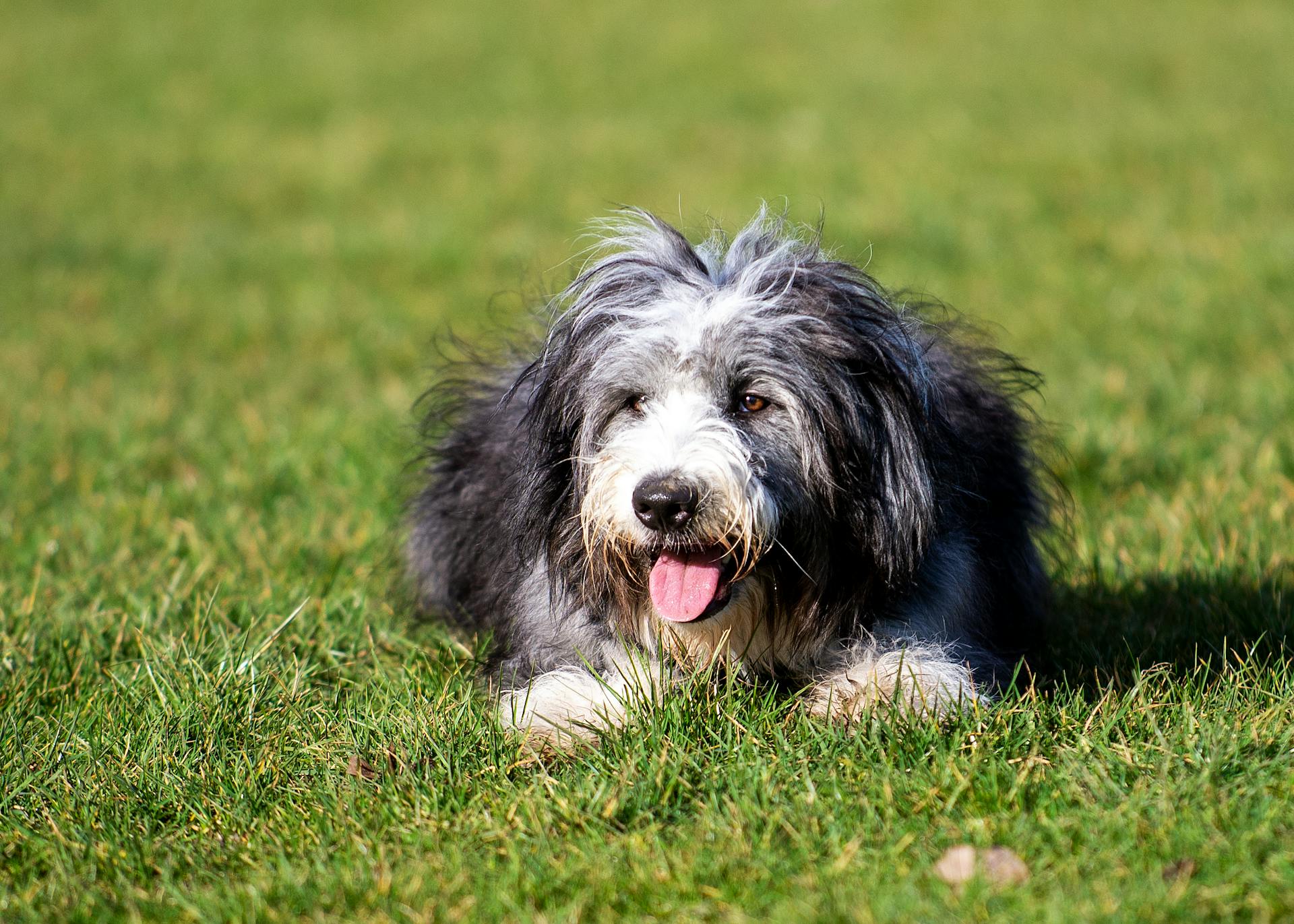
To prevent weight gain, treats should be avoided unless used for training, and even then, only in moderation. You should also check the food label to ensure it's of high quality and includes real meat protein as the first ingredient.
The quality of dog food really matters, and a better food will go further in nourishing your Bearded Collie, requiring less of it to be shaken into the bowl. Bearded collies are individuals, just like people, and they don't all need the same amount of food.
It's essential to monitor your Bearded Collie's calorie intake with the help of a veterinarian, especially since they're prone to becoming overweight. If you're unsure whether your Bearded Collie is overweight, give them the eye test and the hands-on test – you should be able to see a waist and feel, but not see, their ribs.
Curious to learn more? Check out: Best Food for Border Collies
General Information
The Bearded Collie is a medium-sized breed originating from Scotland, weighing between 40-60 pounds. They have a long, shaggy coat in a variety of colors including black, blue, brown, and fawn.
Bearded Collies are intelligent, playful, and affectionate dogs that require high exercise needs. They are generally healthy, but like many breeds, they can be prone to certain genetic conditions like hip dysplasia and progressive retinal atrophy.
Their lifespan is around 12 to 14 years, making them a long-lived breed. They are easy to train, which is a great bonus for any dog owner.
Overview
The Bearded Collie is a breed that originated in Scotland, known for its medium size and long, shaggy coat in a variety of colors. They are intelligent, playful, and affectionate dogs.
Bearded Collies are part of the Herding breed group and are generally healthy, but like many breeds, they can be prone to certain genetic conditions. Their lifespan is around 12 to 14 years, making them a long-lived breed.
This breed is suitable for active households, families, and singles, requiring high exercise needs to stay happy and healthy. They are smart, active, alert, lively, and loyal dogs.
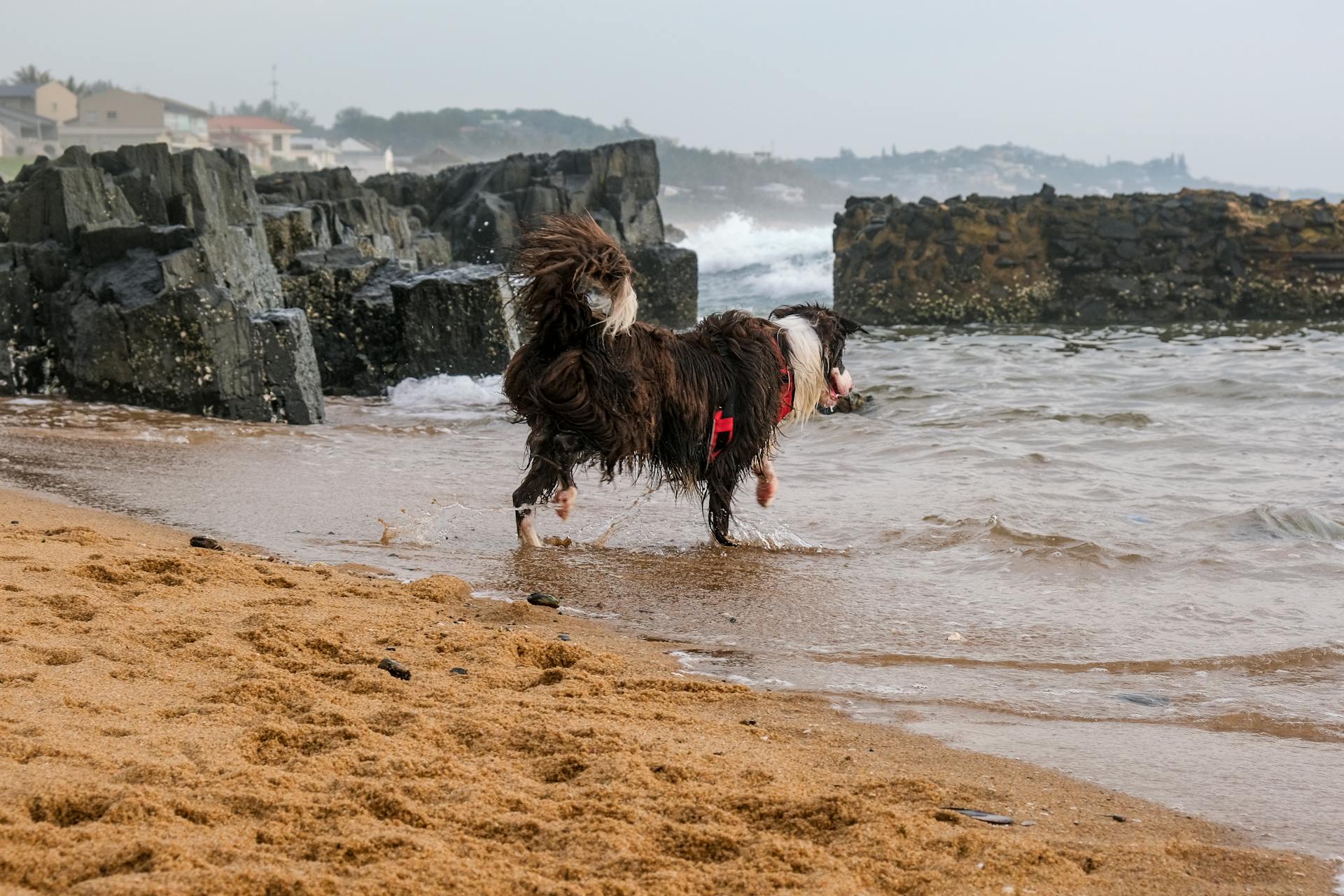
Bearded Collies have a double coat, with a top layer of fur that gives them their shaggy appearance and a softer, thicker bottom layer. Their top layer of fur is straight and somewhat coarse in texture.
Here are some key characteristics of the Bearded Collie breed:
- Weight: 40–60 pounds
- Colors: Black, blue, brown, fawn
- Temperament: Intelligent, playful, affectionate, independent, willful, friendly
Three Little-Known Facts
Here are three little-known facts that might surprise you.
The shortest war in history was between Britain and Zanzibar on August 27, 1896, and lasted only 38 minutes. Zanzibar surrendered after just 12 minutes of fighting, and the remaining 26 minutes were spent on ceasefire negotiations.
In some parts of the world, like the United States, the average person spends about 4.4 hours per day watching TV. That's a lot of screen time, and it's worth considering how it affects our daily lives.
The longest word in the English language, according to the Oxford English Dictionary, is pneumonoultramicroscopicsilicovolcanoconiosis, a lung disease caused by inhaling very fine particles of silica. It has 45 letters and is considered the longest word in English.
Broaden your view: 4 Month Staffordshire Bull Terrier
Service Dogs: Good or Not?
Some breeds of dogs, like Bearded Collies, make good service dogs due to their intelligence and ability to learn complex tasks.
They need to be given a lot of exercise to stay happy and healthy, which is a crucial aspect to consider when thinking about getting a service dog.
Bearded Collies are suited for learning commands and tasks that help their owners, and they love to work, which makes them a great fit for service dog roles.
They can also thrive as emotional support animals and therapy dogs, as long as their basic exercise needs are met.
It's essential to remember that every dog is different, and not all breeds are suited for service work.
You might like: How Much Exercise Do Border Collies Need
Frequently Asked Questions
Do bearded collies bark a lot?
Bearded Collies are generally not known to be excessive barkers, but they may vocalize for attention or to alert their family. They bark for the same reasons as other dogs, but to a moderate extent.
Is a Bearded Collie the same as an Old English Sheepdog?
No, a Bearded Collie and an Old English Sheepdog are distinct breeds with some key differences, including their tail length and carriage. While they share some similarities, they have unique characteristics that set them apart.
Are bearded collies cuddly?
Bearded collies are known for being extremely cuddly and affectionate, making them a great fit for families with young children. Their loyal nature and love for physical touch make them a perfect companion for those seeking a snuggly friend.
Are bearded collies high maintenance?
Yes, bearded collies are considered high maintenance due to their need for regular exercise and grooming. They require a dedicated owner who can meet their energetic and grooming needs.
Do all bearded collies shed a lot?
Bearded Collies are average shedders, not heavy shedders, but they do shed some. Cutting their coat short can make the shedding more noticeable.
Featured Images: pexels.com
